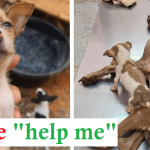Chauncey the attractive pet pushed her head by a gap on the backside of the door of her kennel on the Spartanburg Humane Society. She noticed as yet one more canine and their new household left the shelter.
She wasn’t as gregarious as the opposite dogs, which can have been as a result of her breed. Regardless of the trigger, Chauncey was clearly having hassle discovering her final residence.
In keeping with Angel Cox, CEO of the Spartanburg Humane Society, “Chauncey may be very shy till she will get to know you.” So she basically watched the world go by because the shelter was stuffed with barking and nonstop exercise.
The personnel on the shelter felt horrible for Chauncey. They hoped somebody would give the precocious pup an opportunity since they felt she had the potential to be an exquisite pal. Workers personnel entertained Chauncey whereas she waited by giving her numerous pets and taking her on prolonged walks.
She loved being carried and walked by the volunteers and employees, based on Cox. She is superb on a leash, making her a volunteer favourite.
Chauncey was given again to the humane society after discovering his first residence to be unsuitable. Despite the fact that it had failed, Chauncey was not going to surrender attempting to find her kin.
Finally, one other household entered after seeing a Fb publish about Chauncey. Chauncey was ready to show her endearing character to the fullest this time. They have been instantly obvious to be the best match.
Cox remarked, “She offered herself immediately.” She is a extremely affectionate dog that charmed them along with her tenderness.
The employees on the shelter was ecstatic to see Chauncey depart the humane society along with her household because it meant the dog had lastly discovered her endlessly residence.
“We all the time mourn them after they depart,” Cox mentioned, “however we have been so happy for her to discover a terrific residence.” When they’re adopted, it’s undoubtedly bittersweet, however we’re all the time joyful on the within.
Caring for animals involves various aspects to ensure their well-being and happiness. Here are some detailed methods for animal care:
- Proper Nutrition: Providing balanced and appropriate nutrition is essential for the health of animals. Consult with a veterinarian to determine the best diet for your specific animal, considering factors like age, species, and health status. Ensure access to clean water at all times.
- Regular Exercise: Just like humans, animals need regular physical activity to stay healthy. Make sure they have enough space to move around and engage in natural behaviors. For pets like dogs, daily walks and playtime are crucial.
- Routine Veterinary Care: Schedule regular check-ups with a qualified veterinarian to monitor your animal’s health and address any issues promptly. Vaccinations, parasite control, and dental care are all important aspects of veterinary care.
- Safe Environment: Create a safe and comfortable environment for your animals. This includes shelter from extreme weather conditions, protection from predators (if applicable), and providing appropriate bedding or housing materials.
- Socialization: Many animals are social creatures and require interaction with conspecifics or humans. Ensure that they have opportunities for socialization to prevent loneliness and behavioral issues.
- Grooming: Regular grooming helps maintain the health and appearance of animals. This includes brushing their fur or feathers, trimming nails, and cleaning ears and eyes as needed. Some animals may require professional grooming services.
- Mental Stimulation: Enrichment activities are essential for keeping animals mentally stimulated and preventing boredom. Provide toys, puzzles, or other forms of enrichment to keep them engaged and prevent destructive behaviors.
- Training and Behavioral Management: Proper training is crucial for pets to understand boundaries and follow commands. Positive reinforcement techniques are generally the most effective and humane way to train animals.
- Monitoring Health Signs: Learn to recognize signs of illness or distress in your animals, such as changes in appetite, behavior, or physical appearance. Promptly address any concerns by consulting with a veterinarian.
- Responsible Breeding and Ownership: If you’re involved in breeding animals, do so responsibly, prioritizing the health and welfare of both the parents and offspring. Additionally, only adopt or purchase animals if you can provide them with a lifelong commitment of care.
- Environmental Conservation: For animals in the wild or those in captivity, supporting conservation efforts and advocating for their protection is crucial. This includes preserving natural habitats, combating wildlife trafficking, and supporting ethical wildlife tourism.
- Legal Compliance: Familiarize yourself with relevant laws and regulations pertaining to animal care and welfare in your area. Ensure that you meet all legal requirements for owning or caring for animals.
By following these detailed methods, you can ensure that the animals under your care lead healthy, happy lives.







